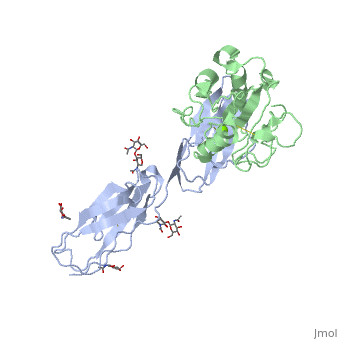1mq8: Difference between revisions
Jump to navigation
Jump to search
No edit summary |
No edit summary |
||
| Line 3: | Line 3: | ||
<StructureSection load='1mq8' size='340' side='right'caption='[[1mq8]], [[Resolution|resolution]] 3.30Å' scene=''> | <StructureSection load='1mq8' size='340' side='right'caption='[[1mq8]], [[Resolution|resolution]] 3.30Å' scene=''> | ||
== Structural highlights == | == Structural highlights == | ||
<table><tr><td colspan='2'>[[1mq8]] is a 4 chain structure with sequence from [https://en.wikipedia.org/wiki/ | <table><tr><td colspan='2'>[[1mq8]] is a 4 chain structure with sequence from [https://en.wikipedia.org/wiki/Homo_sapiens Homo sapiens]. Full crystallographic information is available from [http://oca.weizmann.ac.il/oca-bin/ocashort?id=1MQ8 OCA]. For a <b>guided tour on the structure components</b> use [https://proteopedia.org/fgij/fg.htm?mol=1MQ8 FirstGlance]. <br> | ||
</td></tr><tr id=' | </td></tr><tr id='method'><td class="sblockLbl"><b>[[Empirical_models|Method:]]</b></td><td class="sblockDat" id="methodDat">X-ray diffraction, [[Resolution|Resolution]] 3.3Å</td></tr> | ||
<tr id=' | <tr id='ligand'><td class="sblockLbl"><b>[[Ligand|Ligands:]]</b></td><td class="sblockDat" id="ligandDat"><scene name='pdbligand=MG:MAGNESIUM+ION'>MG</scene>, <scene name='pdbligand=NAG:N-ACETYL-D-GLUCOSAMINE'>NAG</scene></td></tr> | ||
<tr id='resources'><td class="sblockLbl"><b>Resources:</b></td><td class="sblockDat"><span class='plainlinks'>[https://proteopedia.org/fgij/fg.htm?mol=1mq8 FirstGlance], [http://oca.weizmann.ac.il/oca-bin/ocaids?id=1mq8 OCA], [https://pdbe.org/1mq8 PDBe], [https://www.rcsb.org/pdb/explore.do?structureId=1mq8 RCSB], [https://www.ebi.ac.uk/pdbsum/1mq8 PDBsum], [https://prosat.h-its.org/prosat/prosatexe?pdbcode=1mq8 ProSAT]</span></td></tr> | <tr id='resources'><td class="sblockLbl"><b>Resources:</b></td><td class="sblockDat"><span class='plainlinks'>[https://proteopedia.org/fgij/fg.htm?mol=1mq8 FirstGlance], [http://oca.weizmann.ac.il/oca-bin/ocaids?id=1mq8 OCA], [https://pdbe.org/1mq8 PDBe], [https://www.rcsb.org/pdb/explore.do?structureId=1mq8 RCSB], [https://www.ebi.ac.uk/pdbsum/1mq8 PDBsum], [https://prosat.h-its.org/prosat/prosatexe?pdbcode=1mq8 ProSAT]</span></td></tr> | ||
</table> | </table> | ||
== Function == | == Function == | ||
[https://www.uniprot.org/uniprot/ICAM1_HUMAN ICAM1_HUMAN] ICAM proteins are ligands for the leukocyte adhesion protein LFA-1 (integrin alpha-L/beta-2). During leukocyte trans-endothelial migration, ICAM1 engagement promotes the assembly of endothelial apical cups through ARHGEF26/SGEF and RHOG activation. In case of rhinovirus infection acts as a cellular receptor for the virus.<ref>PMID:2538243</ref> <ref>PMID:1968231</ref> <ref>PMID:11173916</ref> <ref>PMID:17875742</ref> | |||
== Evolutionary Conservation == | == Evolutionary Conservation == | ||
[[Image:Consurf_key_small.gif|200px|right]] | [[Image:Consurf_key_small.gif|200px|right]] | ||
| Line 21: | Line 20: | ||
</jmol>, as determined by [http://consurfdb.tau.ac.il/ ConSurfDB]. You may read the [[Conservation%2C_Evolutionary|explanation]] of the method and the full data available from [http://bental.tau.ac.il/new_ConSurfDB/main_output.php?pdb_ID=1mq8 ConSurf]. | </jmol>, as determined by [http://consurfdb.tau.ac.il/ ConSurfDB]. You may read the [[Conservation%2C_Evolutionary|explanation]] of the method and the full data available from [http://bental.tau.ac.il/new_ConSurfDB/main_output.php?pdb_ID=1mq8 ConSurf]. | ||
<div style="clear:both"></div> | <div style="clear:both"></div> | ||
==See Also== | ==See Also== | ||
| Line 38: | Line 28: | ||
__TOC__ | __TOC__ | ||
</StructureSection> | </StructureSection> | ||
[[Category: | [[Category: Homo sapiens]] | ||
[[Category: Large Structures]] | [[Category: Large Structures]] | ||
[[Category: Dong | [[Category: Dong Y]] | ||
[[Category: Joachimiak | [[Category: Joachimiak A]] | ||
[[Category: Jun | [[Category: Jun C-D]] | ||
[[Category: Liu | [[Category: Liu J-H]] | ||
[[Category: McCormack | [[Category: McCormack A]] | ||
[[Category: Shimaoka | [[Category: Shimaoka M]] | ||
[[Category: Springer | [[Category: Springer TA]] | ||
[[Category: Takagi | [[Category: Takagi J]] | ||
[[Category: Wang | [[Category: Wang J-H]] | ||
[[Category: Xiao | [[Category: Xiao T]] | ||
[[Category: Yang | [[Category: Yang Y]] | ||
[[Category: Zhang | [[Category: Zhang R]] | ||
Latest revision as of 11:39, 10 April 2024
Crystal structure of alphaL I domain in complex with ICAM-1Crystal structure of alphaL I domain in complex with ICAM-1
Structural highlights
FunctionICAM1_HUMAN ICAM proteins are ligands for the leukocyte adhesion protein LFA-1 (integrin alpha-L/beta-2). During leukocyte trans-endothelial migration, ICAM1 engagement promotes the assembly of endothelial apical cups through ARHGEF26/SGEF and RHOG activation. In case of rhinovirus infection acts as a cellular receptor for the virus.[1] [2] [3] [4] Evolutionary Conservation Check, as determined by ConSurfDB. You may read the explanation of the method and the full data available from ConSurf. See AlsoReferences
|
| ||||||||||||||||||
